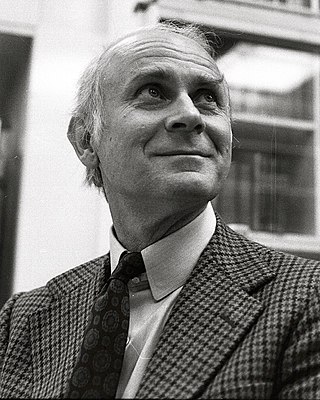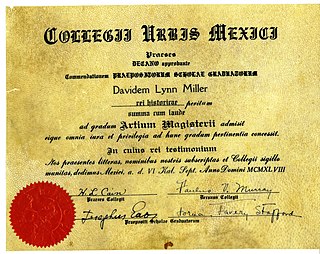Related Research Articles
An academic degree is a qualification awarded to a student upon successful completion of a course of study in higher education, usually at a college or university. These institutions often offer degrees at various levels, usually divided into undergraduate and postgraduate degrees. The most common undergraduate degree is the bachelor's degree, although some educational systems offer lower-level undergraduate degrees such as associate and foundation degrees. Common postgraduate degrees include engineer's degrees, master's degrees and doctorates.
A bachelor's degree or baccalaureate is an undergraduate degree awarded by colleges and universities upon completion of a course of study lasting three to six years. The two most common bachelor's degrees are the Bachelor of Arts (BA) and the Bachelor of Science. In some institutions and educational systems, certain bachelor's degrees can only be taken as graduate or postgraduate educations after a first degree has been completed, although more commonly the successful completion of a bachelor's degree is a prerequisite for further courses such as a master's or a doctorate.
A doctorate or doctoral degree is a postgraduate academic degree awarded by universities and some other educational institutions, derived from the ancient formalism licentia docendi.

Bernhard-Viktor Christoph-Carl von Bülow, known as Vicco von Bülow or Loriot, was a German comedian, humorist, cartoonist, film director, actor and writer. As an artist, he was almost exclusively known under his pen name Loriot, which is the french term for the bird oriole depicted as a crest in the coat of arms of the Bülow family.
An associate degree or associate's degree is an undergraduate degree awarded after a course of post-secondary study lasting two to three years. It is a level of academic qualification above a high school diploma and below a bachelor's degree.

A diploma is a document awarded by an educational institution testifying the recipient has graduated by successfully completing their courses of studies. Historically, it has also referred to a charter or official document of diplomacy.

The Bologna Process is a series of ministerial meetings and agreements between European countries to ensure comparability in the standards and quality of higher-education qualifications. The process has created the European Higher Education Area under the Lisbon Recognition Convention. It is named after the University of Bologna, where the Bologna declaration was signed by education ministers from 29 European countries in 1999. The process was opened to other countries in the European Cultural Convention of the Council of Europe, and government meetings have been held in Prague (2001), Berlin (2003), Bergen (2005), London (2007), Leuven (2009), Budapest-Vienna (2010), Bucharest (2012), Yerevan (2015), Paris (2018), and Rome (2020).
A diploma mill or degree mill is a business that sells illegitimate diplomas or academic degrees, respectively. The term diploma mill is also used pejoratively to describe any educational institution with low standards for admission and graduation, low career placement rate, or low average starting salaries of its graduates.

A postgraduate diploma is a postgraduate qualification awarded after a university degree, which supplements the original degree and awards them with a graduate diploma. The minimum requirement of completing a Bachelor's degree is necessary to start the Postgraduate course. The duration of a Postgraduate course can vary from 1 year to 2 years.
Higher National Diploma (HND), part of the Higher Nationals suite of qualifications, is an academic higher education qualification in the United Kingdom and various other countries. They were introduced in England and Wales in 1920 alongside the Ordinary National Diploma and the Higher National Certificate. A qualification of the same title is also offered in Argentina, Brunei, Cameroon, India, Malta, Nigeria, Ghana, Kenya, and some other countries.
An engineer's degree is an advanced academic degree in engineering which is conferred in Europe, some countries of Latin America, North Africa and a few institutions in the United States. The degree may require a thesis but always requires a non-abstract project. To obtain an Engineer's degree in Asia, the duration of study typically ranges from 4 to 5 years, depending on the country and university. Additionally, there may be further requirements for certifications or licenses to practice engineering after graduation.
Mickey Mouse degrees is a term for university degrees or courses regarded as worthless or irrelevant. The term is a dysphemism, originating in the common usage of "Mickey Mouse" as a pejorative. It came to prominence in the UK after use by the country's national tabloids.
The BTECLevel 3 diploma is a Further Education qualification and vocational qualification taken in England, Wales and Northern Ireland. The qualification is organised and awarded by Pearson within the BTEC brand and it is equivalent to A-Levels. It is equivalent to the GCE A Levels, more specifically to three A2 awards and the AVCE.

Eveline Braun, commonly known as Evelyn Hamann, was a German actress best known for her work with popular German comedian Loriot as well as for her appearances in television series such as The Black Forest Clinic and Adelheid und ihre Mörder.
A postgraduate certificate (abbreviated as PGCert, PG Cert or PGC is a postgraduate qualification at the level of a master's degree.
In the UK education sector, there are a wide range of qualification types offered by the United Kingdom awarding bodies. Qualifications range in size and type, can be academic, vocational or skills-related, and are grouped together into different levels of difficulty. In England, Wales and Northern Ireland, qualifications are divided into Higher Education qualifications, which are on the Framework for Higher Education Qualifications (FHEQ) and are awarded by bodies with degree awarding powers, and Regulated qualifications, which are on the Regulated Qualifications Framework (RQF) and are accredited by Ofqual in England, the Council for the Curriculum, Examinations and Assessment in Northern Ireland and Qualifications Wales in Wales. In Scotland, qualifications are divided into Higher Education qualifications, Scottish Qualifications Authority qualifications and Scottish Vocational Qualifications/Modern Apprenticeships, which are on the Scottish Credit and Qualifications Framework (SCQF). Scottish Higher Education Qualifications are on both the SCQF and the FHEQ.
A graduate certificate is an educational credential representing completion of specialized training at the college or university level. A graduate certificate can be awarded by universities upon completion of certain coursework indicating mastering of a specific subject area. Graduate certificates represent training at different levels in different countries, for example a graduate certificate is at master's degree level in Ireland, but is at a bachelor's degree level in the United Kingdom. In both cases, the graduate certificate represents less work than a degree at the same level.
Lucerne University of Applied Sciences and Arts (HSLU) is one of seven regional, public-funded universities of applied sciences founded in 1997 in its current form. The University was called University of Applied Sciences of Central Switzerland until 15 October 2007. Lucerne University of Applied Sciences and Arts is a Swiss public vocational university with campuses in Lucerne, Horw, Emmenbrücke and Rotkreuz. Prior to Rotkreuz, a small campus in Zug for finance was held.
The Business and Technology Education Council (BTEC) is a provider of secondary school leaving qualifications and further education qualifications in England, Wales and Northern Ireland. While the T in BTEC stood for Technical, according to the DfE (2016) it now stands for Technology. BTECs originated in 1984 and were awarded by Edexcel from 1996. Their origins lie in the Business Education Council, formed in 1974 to "rationalise and improve the relevance of sub-degree vocational education". They are the responsibility of the Minister of State for Skills, Apprenticeships and Higher Education in the Department for Education.
The national qualification frameworks in the United Kingdom are qualifications frameworks that define and link the levels and credit values of different qualifications.
References
- 1 2 Kaufmann, Matthias (19 January 2018). "Endlich gibt's das Jodeldiplom" [At last, the yodeling diploma exists]. Der Spiegel . Retrieved 4 February 2018.
- ↑ Hollmann, Frank (8 May 2008). "Nicht mehr als ein Jodeldiplom" [Nothing more than a yodeling diploma]. Frankfurter Allgemeine Zeitung (in German). Retrieved 4 February 2018.
- ↑ "Die Offizielle Loriot-WebSite - Werke: Fernsehen". loriot.de. n.d. Retrieved 4 February 2018.
- ↑ "Pressemitteilung zur Wertacher Jodlar-Prob". Archived from the original on 4 May 2014. Retrieved 25 March 2010.
- ↑ ""Du dödl di" - Jodeln an der Universität" ["Du dödl di" - Yodeling at university]. Hamburger Abendblatt (in German). 22 January 2018. Retrieved 5 February 2018.